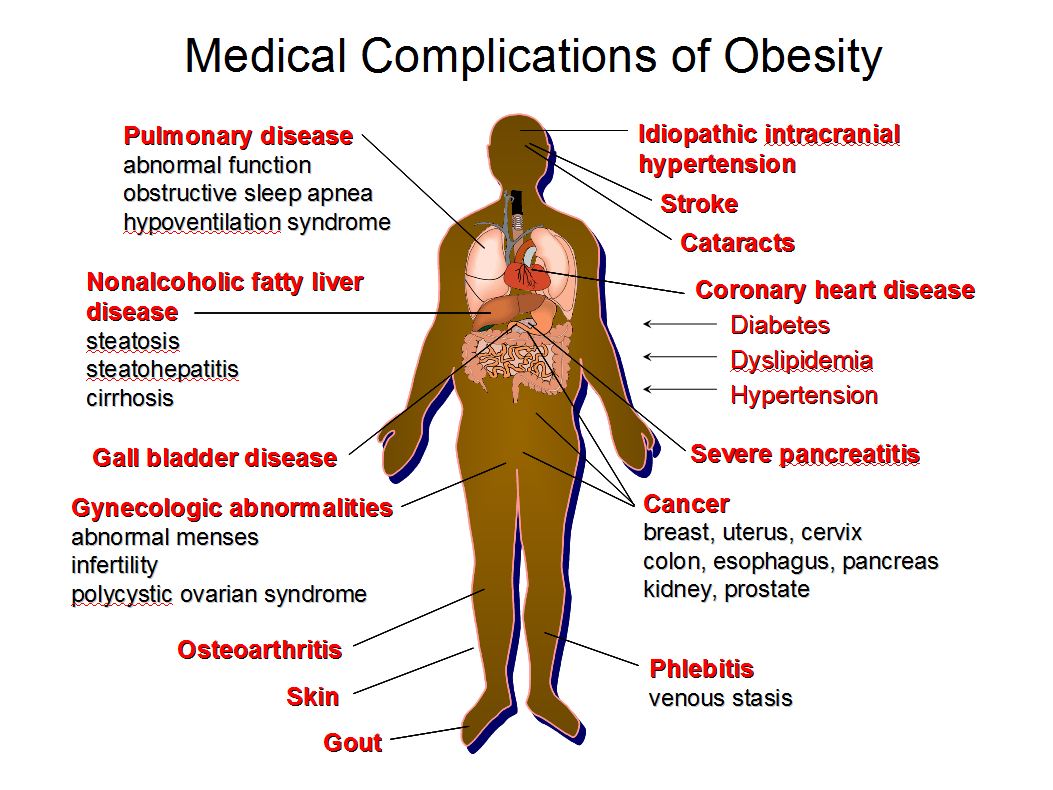So Just Do It!
Colorectal cancer is a major cause of morbidity and mortality throughout the world.1 It accounts for over 9% of all cancer incidence.2,3 It is the third most common cancer worldwide and the fourth most common cause of death.2 It affects men and women almost equally, with just over 1 million new cases recorded in 2002, the most recent year for which international estimates are available.1,4,5,6 Countries with the highest incidence rates include Australia, New Zealand, Canada, the United States, and parts of Europe. The countries with the lowest risk include China, India, and parts of Africa and South America.3Robin P. Boushey, M.D. Ph.D.

Top 10 U.S. cancer sites in 2005: men, all races. From U.S. Cancer Statistics Working Group.
Cancers of the uterus, kidney and esophagus represent the highest proportion of new diagnoses that can be directly attributed to the outcome resulting from overweight and obesity. In Ontario, a new report by Cancer Care Ontario zeroes in on expanding waistlines to explain increases in people's risk of colorectal cancer by a factor of up to 15 percent. The study authors conclude what most people should already be aware of: the maintenance of healthy weight is critical to good health.
A diet whose core encompasses vegetables and fruit, and resisting the impulse to remain sedentary choosing rather to exercise the body in regular physical activity leads to a marked decrease in the risk of hypertension, stroke, cardiovascular diseases, diabetes and particular cancers. The healthy body could also protect people against premature death. Four percent of all new cancers have been attributed to excess body weight (2010).
- Underweight: BMI is less than 18.5
- Normal weight: BMI is 18.5 to 24.9
- Overweight: BMI is 25 to 29.9
- Obese: BMI is 30 or more
 |
| mhadegree.org |
As people put on excess weight their risk of most cancer types rises with the level of weight settling on their bodies. For example the risk for esophageal and uterine cancer increases by 50 percent for every five-kilogram/square metre increase in BMI. For kidney cancer the risk increases by roughly 30 percent and for colorectal cancer the risk rises between ten to fifteen percent, with similar percentage increases for post-menopausal breast and pancreatic cancer.
With this calculated elevated risk for dread cancers as a warning to people that they can and must themselves take steps to ensure that their weight does not increase with age thus leaving them vulnerable to the unfortunate side-effects of weight-gain resulting in cancers, it is well within the capacity of anyone to take remedial measures in lifestyle. Yet even knowing that a healthy diet can protect against the onset of chronic disease, people tend to ignore the warnings.
It is possible to reduce the risk of cardiovascular disease by eating non-starchy vegetables and fruit, and the dietary fibre intake as well provides additional protection against Type 2 (adult-onset) diabetes. When people succumb to the allure of eating unhealthy (processed food products densely loaded with increased fat, sugars, salt, and decreased nutritional value) energy-dense foods high in saturated and trans fats, refined sugars and carbohydrates, they contribute themselves to an increased risk of chronic disease through the inevitable weight gain.
High consumption of red and processed meat has been linked to cardiovascular disease and the onset of Type 2 diabetes, while excess salt consumption can lead to high blood pressure increasing the risk of heart disease and stroke. Ensuring the intake on a daily basis of fruits and vegetables to at least five or more helpings helps immeasurably to attain a balanced, healthy diet. Dietary fibre derived from legumes and grains, vegetables and fruit represents a protective factor against colorectal cancer.
Ensuring that moderate physical activity remains part of a daily regimen is considered a protective factor for colon cancer, and may as well help against post-menopausal breast cancer and uterine cancer. Sedentary habits; prolonged periods of physical inactivity or low levels of same as daily habits or circumstances; from sitting at a desk at work, to taking public or personal transportation, spending time watching television, computer use, all are part of 'sitting around', not expending energy and exercising the body.
Evidence is steadily emerging of a link between sedentary behaviour and the increased risk of colorectal, uterine, ovarian, prostate and lung cancers. All leading to persuasive evidence that we can and should commit to a healthier lifestyle. That healthier lifestyle, working against weight gain, improves the quality of life in many ways, including feeling better about ourselves, and enjoying life more, with the effort involved to make the most of the only lives we'll ever have.
Labels: Disease, Environment, Health, Lifestyle

0 Comments:
Post a Comment
<< Home